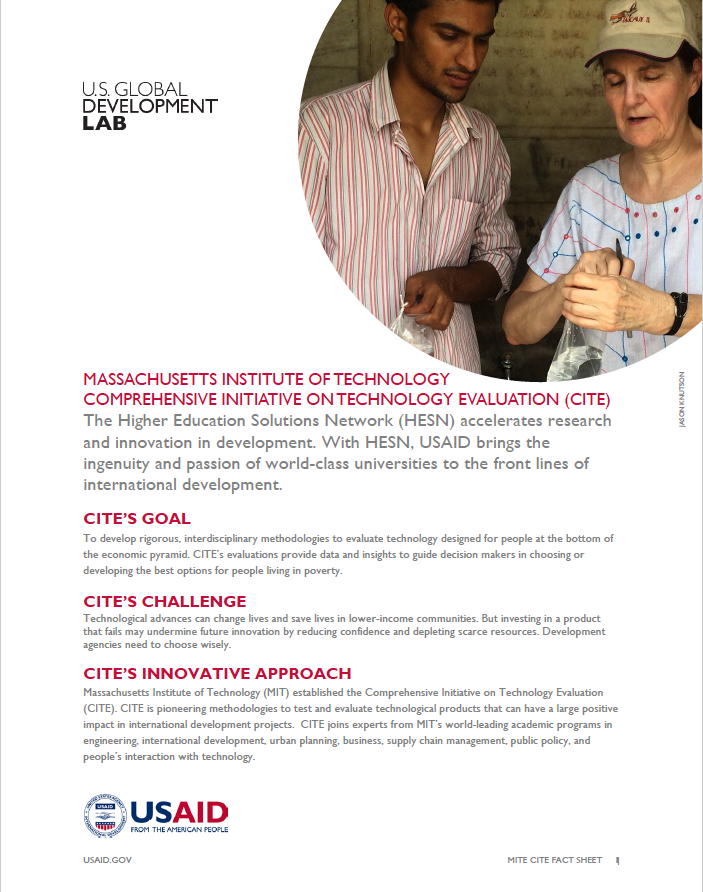- What We Do
- Agriculture and Food Security
- Democracy, Human Rights and Governance
- Economic Growth and Trade
- Education
- Environment and Global Climate Change
- Gender Equality and Women's Empowerment
- Global Health
- Humanitarian Assistance
- Transformation at USAID
- Water and Sanitation
- Working in Crises and Conflict
- U.S. Global Development Lab
Speeches Shim

CITE's Goal
To develop rigorous, interdisciplinary methodologies to evaluate technology designed for people at the bottom of the economic pyramid. CITE’s evaluations provide data and insights to guide decision makers in choosing or developing the best options for people living in poverty.
CITE's Challenge
Technological advances can change lives and save lives in lower-income communities. But investing in a product that fails may undermine future innovation by reducing confidence and depleting scarce resources. Development agencies need to choose wisely.
CITE's Innovative Approach
Massachusetts Institute of Technology (MIT) established the Comprehensive Initiative on Technology Evaluation (CITE). CITE is pioneering methodologies to test and evaluate technological products that can have a large positive impact in international development projects. CITE joins experts from MIT’s world-leading academic programs in engineering, international development, urban planning, business, supply chain management, public policy, and people’s interaction with technology.
To empower development professionals and end users in choosing among competing technologies, CITE’s experts created the “3-S” framework for evaluation, testing the following questions:
- Suitable: Does a product perform its intended purpose?
- Scalable: Can its supply chain effectively reach consumers?
- Sustainable: Is it used correctly, consistently, and continuously over time?
Testing Solutions in the Feld
Teams test products’ technical specifications in the lab and field, as well as their relevance to specific communities, using surveys, interviews, and, in some cases, automated sensors.
CITE faculty, staff, and students are testing solutions and exploring ways to apply them on a larger scale. Preliminary results include:
- Solar powered lanterns in Uganda: Users identified cost as the largest barrier towards adoption, and one of the most critical features was the ability to charge cell phones.
- Water filters in India: Low-cost filters used by the poor are not effective, while the most effective filters were also the most expensive and wasteful. Additionally, there is potential for expanding use of filters through financing or entrepreneurship models.
CITE has also evaluated post-harvest food storage technologies, malaria rapid diagnostic tests, water test kits, and educational technologies. In 2016, CITE is conducting evaluations on solar water pumps, wheelchairs, and food aid packaging.
Solutions devised for particular countries usually yield approaches that are useful in others. For example, CITE’s methodology for testing solar lanterns in Uganda was later used by MIT students in Morocco to gauge demand for solar lights among rural residents and street vendors.
Cultivating Hubs for Innovation and Evaluation
In 2016, CITE will partner with the Self Employed Women’s Association (SEWA) Bharat to learn how young women in India's informal sector define, perceive, purchase, and interact with technology in their work and day-to-day lives. Findings from a pilot project will enable CITE and SEWA to determine what role technology evaluation could play in SEWA’s programs at scale, enabling SEWA’s members to use CITE’s technology evaluation methods to improve the lives of themselves and their families.
Engaging Students
CITE trains future development evaluation professionals on the methodologies they have pioneered. Students gain direct experience as research assistants, fellows, and interns with CITE projects and partners. Through field experience, students acquire skills in research, communication, and project management that they can apply in their careers. CITE has also developed classroom and online courses on evaluating technology for developing countries to educate stakeholders, researchers, and practitioners. The online courses will be available to the public on the open-access platform, edX.
Partners
MIT’s Department of Urban Studies and Planning, D-Lab, Sociotechnical Systems Research Center, Center for Transportation and Logistics, Public Service Center, Sloan School of Management, and Department of Mechanical Engineering; Indian Institute of Technology- Gandhinagar, Indian Institute of Management-Ahmedabad, the Centre for Environmental Planning and Technology University-Ahmedabad, Viksat, World Food Programme, Makerere University, Malaria Consortium, World Vision, and additional local partners.
For more information
http://cite.mit.edu/ • https://twitter.com/CITEatMIT
The Higher Education Solutions Network (HESN) accelerates research and innovation in development. With HESN, USAID brings the ingenuity and passion of world-class universities to the front lines of international development. Since 2012, HESN has supported Development Labs at seven universities that engage students, researchers, faculty, and their partners in innovating scientific and technological approaches to the world's most challenging development problems. By evaluating and field-testing approaches in partnership with local institutions, HESN Development Labs identify solutions that are efficient, cost-effective, accessible, and sustainable, then strategize how to apply them on a large scale. With funding over five years from USAID and matching investments from the universities, the HESN network has grown into a vibrant collaboration among more than 650 partner institutions in academia, civil society, and government in more than 65 countries.


Comment
Make a general inquiry or suggest an improvement.